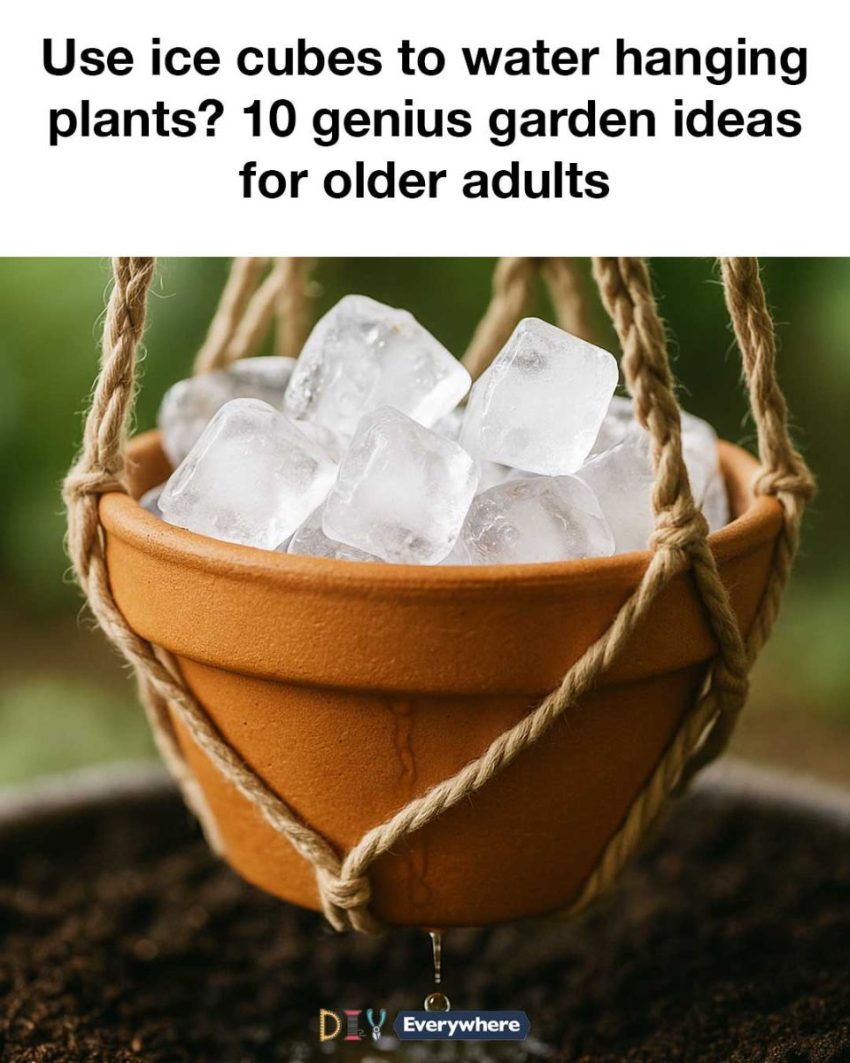ADVERTISEMENT
1. Ice Cubes for Slow Watering
Using ice cubes to water hanging plants is a clever solution for older adults who may find it difficult to reach high or awkwardly placed planters. By placing a few ice cubes on the soil surface, the water is released slowly as the ice melts, allowing for gradual absorption by the plant’s roots. This method not only prevents overwatering but also ensures that the plant receives a steady supply of moisture.
For optimal results, use 2-3 ice cubes per small hanging plant and adjust the number based on the size of the planter. This technique is particularly useful for plants that prefer consistent moisture levels, such as ferns and begonias.
2. Raised Garden Beds for Easy Access
Raised garden beds are an excellent option for older adults who may have difficulty bending or kneeling. These elevated planters can be built at a height that is comfortable for standing or sitting, reducing strain on the back and knees. A typical raised bed is about 2-3 feet high, but the height can be adjusted to suit individual needs.
In addition to accessibility, raised beds offer better soil drainage and can be filled with high-quality soil, promoting healthier plant growth. They also help keep pests at bay and can be designed with built-in seating for added convenience.
3. Self-Watering Planters
Self-watering planters are a fantastic solution for older adults who may forget to water their plants regularly or have difficulty carrying heavy watering cans. These planters have a built-in reservoir at the bottom that supplies water to the plant’s roots through capillary action. This ensures that the plant receives a consistent supply of moisture without the need for frequent watering.
To use a self-watering planter, simply fill the reservoir with water, and the planter will take care of the rest. These planters are available in various sizes and styles, making them suitable for both indoor and outdoor gardening.
4. Vertical Gardens to Save Space
Vertical gardens are an innovative way to maximize gardening space, especially for those with limited room or mobility issues. By growing plants on walls or trellises, older adults can enjoy a lush garden without the need for extensive bending or reaching.
Vertical gardens can be created using wall-mounted planters, hanging pockets, or stacked pots. They are ideal for growing herbs, small vegetables, and flowering plants. This method not only saves space but also adds a beautiful, green aesthetic to any area.
5. Lightweight Tools for Less Strain
Gardening tools can be heavy and cumbersome, making them difficult for older adults to use. Fortunately, there are many lightweight tools available that reduce strain and make gardening tasks more manageable. Look for tools made from materials like aluminum or fiberglass, which are durable yet light.
Tools with telescopic handles are also beneficial, as they allow for easy adjustment to the user’s height, minimizing the need for bending or stretching. Essential lightweight tools include trowels, pruners, and hoes, all designed to make gardening more accessible and enjoyable.
6. Ergonomic Handles for Comfort
Ergonomic handles are designed to fit comfortably in the hand, reducing strain and fatigue during gardening tasks. These handles are often cushioned and shaped to provide a better grip, making them ideal for older adults with arthritis or limited hand strength.
When selecting gardening tools, look for those with ergonomic handles that have a non-slip surface and are easy to hold. This small adjustment can make a significant difference in comfort and efficiency, allowing older adults to garden for longer periods without discomfort.
7. Container Gardening for Flexibility
Container gardening offers flexibility and convenience, allowing older adults to grow plants in pots or containers that can be easily moved and arranged. This method is perfect for those with limited space or mobility, as containers can be placed on tables, shelves, or even wheeled carts for easy access.
Containers come in various sizes and materials, from lightweight plastic to decorative ceramic. They can be used to grow a wide range of plants, including vegetables, herbs, and flowers. Container gardening also allows for better control over soil quality and drainage, promoting healthier plant growth.
8. Drip Irrigation Systems
Drip irrigation systems are an efficient way to water plants, delivering water directly to the roots with minimal waste. This system is ideal for older adults who may find traditional watering methods labor-intensive or inefficient.
A basic drip irrigation system consists of a network of tubes and emitters that can be easily installed in garden beds or containers. The system can be connected to a timer, ensuring plants receive consistent watering even when the gardener is away. This not only saves time and effort but also conserves water, making it an eco-friendly choice.
9. Mulching to Retain Moisture
Mulching is a simple yet effective technique to retain soil moisture, suppress weeds, and improve soil health. For older adults, mulching reduces the need for frequent watering and weeding, making garden maintenance more manageable.
Organic mulches, such as shredded bark, straw, or compost, are excellent choices as they decompose over time, enriching the soil with nutrients. Apply a 2-3 inch layer of mulch around plants, being careful not to cover the stems, to maximize its benefits.
10. Companion Planting for Pest Control
Companion planting involves growing certain plants together to enhance growth and deter pests naturally. This method is beneficial for older adults who prefer to avoid chemical pesticides and fertilizers.
For example, planting marigolds alongside vegetables can help repel nematodes and other harmful insects. Similarly, basil planted near tomatoes can improve flavor and deter flies. By strategically pairing plants, gardeners can create a more balanced and healthy ecosystem in their garden.
11. Using Smart Technology for Garden Management
Smart technology is revolutionizing the way we manage gardens, offering tools that simplify tasks and improve efficiency. For older adults, smart garden devices can reduce physical exertion and ensure optimal plant care.
Smart irrigation systems, for example, can be programmed to water plants at specific times, while soil sensors provide real-time data on moisture levels and nutrient content. Additionally, garden apps can help track planting schedules and provide reminders for maintenance tasks. By integrating smart technology, older adults can enjoy a thriving garden with minimal effort.


